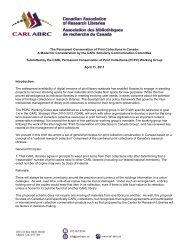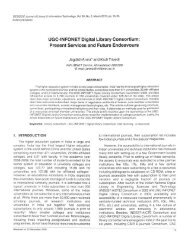PDF - CARL - ABRC
PDF - CARL - ABRC
PDF - CARL - ABRC
You also want an ePaper? Increase the reach of your titles
YUMPU automatically turns print PDFs into web optimized ePapers that Google loves.
enables scholars to undertake original research into the entire lexical content of Early Modern<br />
English. The Project is run by scholars, and co-published by the University of Toronto Press Inc.<br />
and the University of Toronto Library. The University of Toronto Libraries provides technical<br />
support for the project and hosts both the public and licensed database. The University of Toronto<br />
Press provides the sales, marketing and access control for the licensed product.<br />
One of the challenges for the Press has is keeping up with the rapidly changing technologies for<br />
both journals and book production. Choosing and implementing the appropriate technical<br />
platforms for publishing and providing access to content involves significant investments in both<br />
staff time and money. Yet, these choices are hard to make because technologies are changing so<br />
rapidly, the market for print products continues to dominate and it is difficult to predict their<br />
future direction. That being said, UTP is well underway in changing to meet the new digital<br />
reality.<br />
V. Digitization and Print on Demand Services<br />
Both libraries and publishers are looking at print on demand (PoD) services for monographs and<br />
other types of material. PoD enables books to be printed one at a time. “The book, including the<br />
cover, is set up as a digital file. When an order comes through, the right file is selected by the<br />
computer, which then gives the instruction to the print on demand machine to produce it.” 15<br />
Publishers view print on demand as a cost-effective way of keeping their backlist going. For<br />
books ‘in print’, PoD saves money on storage and warehousing costs and no funds get tied up in<br />
stock, “allowing books to be published with very much less initial investment and ongoing<br />
cost” 16 . For libraries, print on demand usually means offering out-of-copyright books from its<br />
digitized collection to a wider readership- sometimes for a fee.<br />
Case Study: McMaster University Libraries Digitization Program<br />
http://digitalcommons.mcmaster.ca/mcmastercollection/<br />
The McMaster University Library owns a Kirtas robotic book scanner and has begun a program<br />
to digitize out-of-copyright books in the collection. Collectively dubbed “The McMaster<br />
Collection,” the library has more than 90,000 books available for scanning through its digitize on<br />
demand site, described below. As books are digitized, records for the electronic version will be<br />
added to the library catalogue, integrating them with the full collection of print and electronic<br />
resources available through the library.<br />
The library has established relationships to support re-publication of their digitized collection.<br />
15 Definition taken from the website, Writers Services, http://www.writersservices.com/res/ri_POD.htm<br />
16 Definition taken from the website, Writers Services, http://www.writersservices.com/res/ri_POD.htm<br />
23












